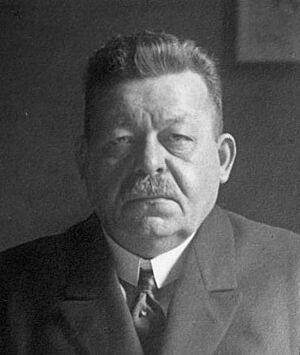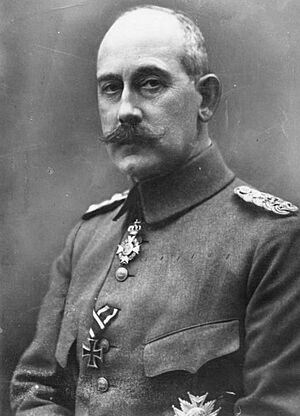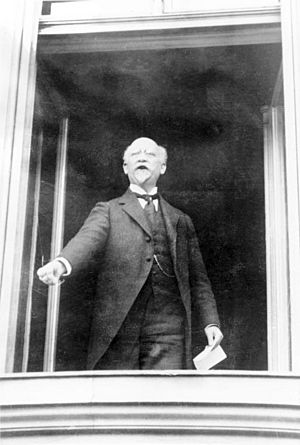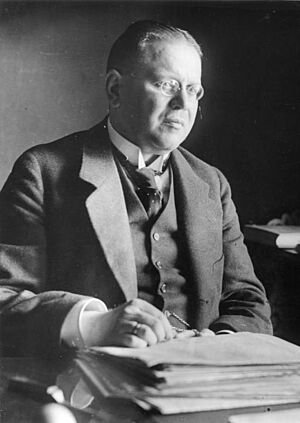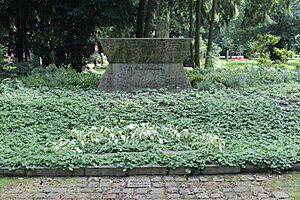Philipp Scheidemann facts for kids
Quick facts for kids
Philipp Scheidemann
|
|
|---|---|
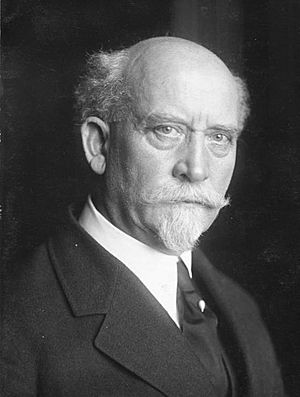 |
|
| Minister President of Germany | |
| In office 13 February 1919 – 20 June 1919 |
|
| President | Friedrich Ebert |
| Deputy | Eugen Schiffer Bernhard Dernburg |
| Preceded by | Friedrich Ebert (de facto) |
| Succeeded by | Gustav Bauer |
| Mayor of Kassel | |
| In office 19 November 1919 – 1 October 1925 |
|
| Preceded by | Erich Koch-Weser |
| Succeeded by | Herbert Stadler |
| Minister for the Colonies | |
| In office 13 December 1918 – 13 February 1919 |
|
| Chancellor | Friedrich Ebert |
| Preceded by | Wilhelm Solf |
| Succeeded by | Johannes Bell |
| Staatssekretär without Portfolio | |
| In office 4 October 1918 – 9 November 1918 |
|
| Chancellor | Max von Baden |
| Preceded by | Office established |
| Succeeded by | Office abolished |
| Leader of the Social Democratic Party | |
| In office 20 October 1917 – 15 June 1919 |
|
| Serving with | Friedrich Ebert |
| Preceded by | Hugo Haase |
| Succeeded by | Herman Müller Otto Wels |
| Member of the Reichstag for Hesse-Nassau |
|
| In office 6 February 1919 – 22 March 1933 |
|
| 1919–1920 | Weimar National Assembly |
| Preceded by | Constituency established |
| Succeeded by | Constituency abolished |
| Member of the Reichstag for Düsseldorf 3 |
|
| In office 3 December 1903 – 9 November 1918 |
|
| Preceded by | Louis Sabin |
| Succeeded by | Constituency abolished |
| Personal details | |
| Born |
Philipp Heinrich Scheidemann
26 July 1865 Kassel, Electorate of Hesse |
| Died | 29 November 1939 (aged 74) Copenhagen, Denmark |
| Political party | Social Democratic Party (1883–1939) |
| Spouse | Johanna Dibbern |
| Children | Lina Liese Hedwig |
Philipp Scheidemann (born July 26, 1865 – died November 29, 1939) was an important German politician from the Social Democratic Party of Germany (SPD). He played a key role in Germany during the early 1900s and in the new Weimar Republic. After Germany lost World War I, a revolution began. Scheidemann famously announced the creation of a German Republic from the Reichstag building in 1918.
In 1919, he became the first Minister President of Germany, similar to a prime minister. He led the government that was tasked with writing a new constitution. However, he resigned later that year because his government could not agree on whether to accept the harsh terms of the Treaty of Versailles, which officially ended World War I.
Scheidemann continued to be a member of the German parliament (the Reichstag) until 1933. He also served as the mayor of his hometown, Kassel, from 1920 to 1925. When Adolf Hitler and the Nazi Party took power in 1933, Scheidemann had to leave Germany. He was seen as one of the "November criminals" by the Nazis, who blamed him and others for Germany's defeat in the war and the end of the German Empire. He lived in Copenhagen, Denmark, and wrote many books about German politics before he died in 1939.
Contents
Philipp Scheidemann's Early Life
Philipp Scheidemann was born in Kassel, Germany, on July 26, 1865. His father was an upholsterer. Philipp had two sisters.
He went to school until 1879. After his father passed away that year, his family faced financial hardship. Philipp then became a typesetter and printer, working in the printing trade until he was 30 years old.
In 1883, Scheidemann joined the SPD, a political party that was actually banned at the time by the German government. He also became part of a trade union for printers. He continued his education at the University of Marburg.
In 1889, he married Johanna Dibbern. They had three daughters: Lina, Liese, and Hedwig.
In 1895, Scheidemann stopped working as a printer and became a journalist for various Social Democratic newspapers. He wrote political articles and even published stories in the local dialect under a pen name.
Rising in Politics and Parliament
In 1903, Philipp Scheidemann was elected to the Reichstag of the German Empire, which was the German parliament. He was re-elected several times. From 1906 to 1911, he also served as a city councilor in Kassel.
In 1911, he joined the SPD's main leadership committee. In 1913, after the death of the long-time SPD leader August Bebel, Scheidemann became a co-leader of the SPD group in the Reichstag. He was known for his strong speaking skills. People described him as a "brilliant speaker" who could connect with large crowds and small groups.
Scheidemann was a practical politician. He tried to avoid conflicts that seemed impossible to solve. He would only strongly support a cause if he thought it could succeed. Before World War I, he often spoke about money matters and the army. He was seen as a moderate voice within his party.
In 1912, he became the first Social Democrat to be elected as a vice president of the Reichstag. However, he refused to visit the emperor, which was a tradition, so he couldn't take office. He finally held the position for a few months in 1918.
Scheidemann During World War I
During World War I, Scheidemann tried to find a middle ground within the SPD. He generally supported funding the war but was against a "victorious peace" that would take land from other countries. He believed in a peace agreement without adding new territories. He famously said, "What is French shall remain French, what is Belgian shall remain Belgian, what is German shall remain German." This statement angered many German nationalists who called him a "traitor."
In 1917, the SPD split over the war. The anti-war group formed the Independent Social Democratic Party of Germany (USPD). Scheidemann remained with the main SPD, which was then called the Majority Social Democratic Party of Germany (MSPD). From October 1917, he was the MSPD party chairman alongside Friedrich Ebert.
To prevent more extreme actions at home, Scheidemann, Friedrich Ebert, and Otto Braun helped lead the January strikes of 1918. Over a million workers demanded better conditions, an end to the war, and a more democratic government. This action made the political right wing dislike them even more.
In September 1918, Scheidemann played a big part in removing the old government. He and Ebert had different ideas about what to do next. When Prince Maximilian von Baden was suggested as the new leader, Scheidemann felt it was wrong for Social Democrats to support a prince. However, Ebert convinced the party to join von Baden's government. This was the first time SPD members served in the imperial government.
Scheidemann became a state secretary without a specific department. He used his position to help political prisoners. He personally pushed for the release of Karl Liebknecht, a socialist leader, despite opposition from the military.
Proclaiming the Republic
As Germany faced defeat and a revolution was brewing, Scheidemann believed that Emperor Wilhelm II had to step down. On November 9, 1918, Chancellor Max von Baden announced that the Emperor had abdicated (given up his throne).
Around noon that day, a huge crowd gathered outside the Reichstag building. People were calling for a speech. Friedrich Ebert, who was now the new Chancellor, refused to speak to them. But Scheidemann quickly went to a window facing the crowd. He had heard that another socialist leader, Karl Liebknecht, planned to declare Germany a "soviet republic," which would be a communist state. To prevent this, Scheidemann decided to act.
From the window, he shouted, "The monarchy has collapsed! Long live the German Republic!" When he returned, a furious Ebert confronted him, saying Scheidemann had no right to declare a republic. Ebert believed that a special assembly should decide Germany's future. However, for Scheidemann, it was clear that the people expected a complete break from the old imperial system.
Later that day, Ebert formed a temporary government called the Council of the People's Deputies. Scheidemann was one of its six members, serving from November 1918 to February 1919. He was mainly in charge of financial matters.
Leading the Government
In January 1919, Scheidemann was elected to the Weimar National Assembly, a special parliament created to write a new constitution. He wanted Ebert to become the head of government, but Ebert aimed to be the first President. Scheidemann ran against Ebert for president but lost.
Ebert then asked Scheidemann to form a new government. On February 13, 1919, Scheidemann became the first Reich Minister President, which was the title for the head of government before the new constitution was finished.
Scheidemann led a government made up of his SPD party, the Centre Party, and the German Democratic Party. This group was known as the Weimar Coalition. Historians say Scheidemann was good at moderating discussions and keeping the government working together.
One of the biggest challenges for his government was dealing with strikes across Germany in early 1919. Workers demanded better wages and conditions. In some areas, they also wanted mines to be owned by the state. Scheidemann's government sometimes used military force (like the Freikorps) but also tried to negotiate. They introduced the eight-hour workday for office workers and accepted workers' committees.
The most difficult decision during Scheidemann's time as Minister President was whether to accept the Treaty of Versailles. This treaty imposed very harsh conditions on Germany after World War I. Scheidemann was strongly against signing it. On May 12, 1919, he famously said, "What hand should not wither that puts this fetter on itself and on us?" meaning that anyone who signed it would be cursed.
Many Germans agreed with him at first. However, some politicians, like Matthias Erzberger, warned that refusing the treaty would lead to the Allies occupying all of Germany. The military and President Ebert also urged acceptance. Since his government could not agree, and Scheidemann felt he could not sign the treaty, he resigned on June 20, 1919.
Political Life After 1919
After leaving the government, Scheidemann continued to be a member of the Reichstag until 1933. He also served as the mayor of Kassel from 1920 to 1925.
He became a strong voice for those in his party who felt that party principles should always come before government decisions. He believed that loyalty to government officials had limits, especially if it went against the party's core beliefs or the people's interests.
In 1926, Scheidemann revealed in the Reichstag that the German army (the Reichswehr) was secretly working with the Soviet Army. This was against the Treaty of Versailles, which limited Germany's military. His revelation caused a political scandal and led to the fall of the government at the time.
Mayor of Kassel
Philipp Scheidemann was elected Mayor of Kassel on December 19, 1919. He held this position until 1925. Some people criticized him, saying that a craftsman's son was not qualified to be mayor, and that he neglected his duties in Kassel because of his work in the Reichstag.
In 1924, the SPD lost many seats in Kassel's city elections, giving other parties a majority. A vote of no confidence against Scheidemann passed, but it wasn't legally binding. Eventually, he left office on October 1, 1925, and focused on his work in the Reichstag. He also wrote several books, including his autobiography, Memoirs of a Social Democrat.
Facing Danger and Exile
For many years, extreme right-wing groups saw Scheidemann as a symbol of the "Weimar system" and blamed him for Germany's defeat.
On June 4, 1922, while he was mayor of Kassel, an attempt was made on his life. Two men sprayed his face with poison. Scheidemann survived because strong winds prevented the poison from fully entering his mouth and nose. After this, he received many death threats and his house was vandalized with swastikas. He began carrying a pistol for protection. This attack was part of a series of political murders by extremist groups.
When the National Socialists (Nazis) came to power in Germany on January 30, 1933, Scheidemann was in great danger. He was seen as a leading "November criminal" by the Nazis. A few days after the Reichstag fire in February 1933, he fled to Austria. His important political notes and diaries were left behind and were taken by the police. They are now considered lost.
After living in Czechoslovakia, Switzerland, France, and the United States, Scheidemann settled in Denmark in 1935. The German government took away his German citizenship in 1933. Even though his health was declining, he closely watched events in Germany and wrote articles for Danish newspapers under a fake name.
Philipp Scheidemann passed away in Copenhagen on November 29, 1939. In 1953, his ashes were brought back to Kassel, Germany, and buried in the main cemetery. His grave is now an honored site in the city.
Writings from Exile
In his final years, Scheidemann wrote many papers where he looked back critically at the SPD's political actions between 1918 and 1933. His daughter buried these papers near Copenhagen when Germany occupied Denmark in 1940. She found them again in 1945.
In these writings, Scheidemann criticized Friedrich Ebert, saying he had "ruined" the SPD with serious political mistakes. He described Ebert as a calculating leader who often worked behind the scenes. Scheidemann felt he had "bitterly regretted" leaving the party leadership in 1919. He also strongly criticized the SPD and trade union leaders in 1932 and 1933 for their actions when the Nazis were rising to power. He called their attempts to "find a way to get along with Hitler" "unparalleled."
See also
 In Spanish: Philipp Scheidemann para niños
In Spanish: Philipp Scheidemann para niños
 | George Robert Carruthers |
 | Patricia Bath |
 | Jan Ernst Matzeliger |
 | Alexander Miles |


